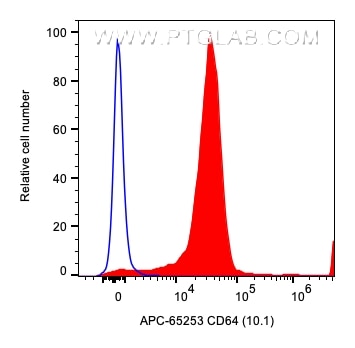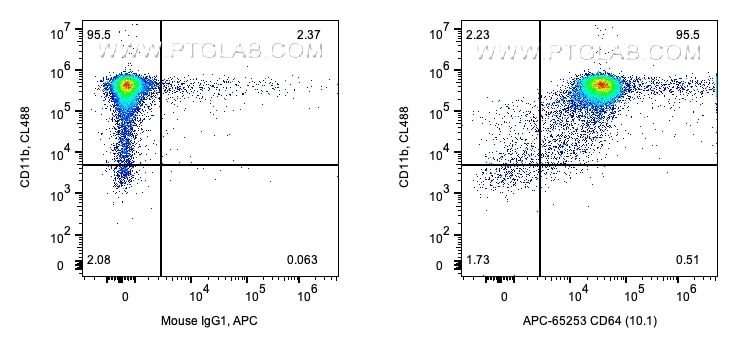Validation Data Gallery
Tested Applications
| Positive FC detected in | human PBMCs |
Recommended dilution
| Application | Dilution |
|---|---|
| This reagent has been pre-titrated and tested for flow cytometric analysis. The suggested use of this reagent is N/A per 10^6 cells in a 100 µl suspension or N/A per 100 µl of whole blood. | |
| Sample-dependent, Check data in validation data gallery. | |
Product Information
APC-65253 targets CD64 in FC applications and shows reactivity with human samples.
| Tested Reactivity | human |
| Host / Isotype | Mouse / IgG1, kappa |
| Class | Monoclonal |
| Type | Antibody |
| Immunogen | Human rheumatoid synovial fluid cells and fibronectin-purified monocytes. 相同性解析による交差性が予測される生物種 |
| Full Name | Fc fragment of IgG, high affinity Ia, receptor (CD64) |
| Calculated molecular weight | 374 aa, 43 kDa |
| GenBank accession number | BC032634 |
| Gene Symbol | FCGR1A |
| Gene ID (NCBI) | 2209 |
| ENSEMBL Gene ID | ENSG00000150337 |
| RRID | AB_3672348 |
| Conjugate | APC Fluorescent Dye |
| Excitation/Emission maxima wavelengths | 650 nm / 660 nm |
| Form | Liquid |
| Purification Method | N/A |
| UNIPROT ID | P12314 |
| Storage Buffer | PBS with 0.09% sodium azide and 0.5% BSA. |
| Storage Conditions | Store at 2-8°C. Avoid exposure to light. Stable for one year after shipment. |
Background Information
Fcγ receptor comprise a multigene family of integral membrane glycoproteins that exhibit complex activation or inhibitory effects on cell functions after aggregation by complexed immunoglobulin G (IgG) (PMID: 17005690 ). CD64, also known as FcγRIA, is a high-affinity receptor for the Fc region of IgG. It is expressed by monocytes/macrophages, activated neutrophils, dendritic cells, and early myeloid cells (PMID: 23293080; 19642859; 7680917). CD64 functions in both innate and adaptive immune responses.
Protocols
| Product Specific Protocols | |
|---|---|
| FC protocol for APC CD64 antibody APC-65253 | Download protocol |
| Standard Protocols | |
|---|---|
| Click here to view our Standard Protocols |

